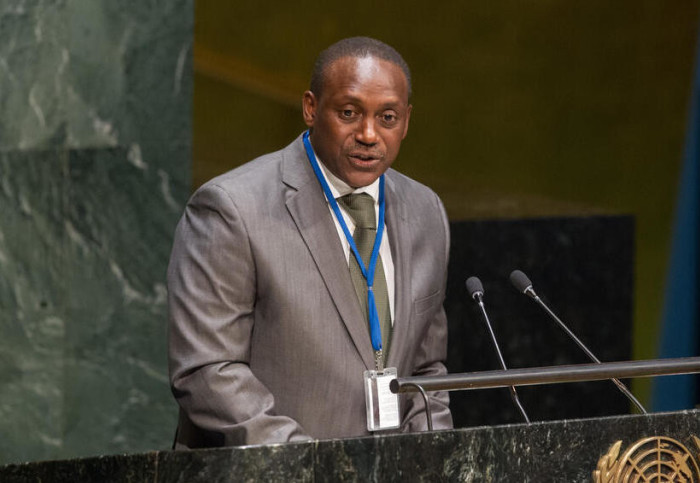Former UN diplomat calls for ‘bold political leadership’ on energy transitions

Dr Kandeh Yumkella pictured at the United Nations in 2015. Credit: UN Photo/Loey Felipe
Former UN Under-Secretary-General Dr Kandeh Yumkella delivered the 2021 Energy Futures Lab Annual Lecture on the urgency of the energy transition.
Dr Yumkella, who also served as Director-General of the UN Industrial Development Organisation and founding CEO of Sustainable Energy for All, called for strong commitments from rich nations on emissions reductions and investment in the Global South ahead of the COP26 climate summit in Glasgow.
Speaking from Sierra Leone, where he is a Member of Parliament and CEO of the Energy Nexus Network, he said this is a decisive decade for action on climate change but warned that, despite their rhetoric, most countries have so far failed to commit to reducing their greenhouse gas emissions to net zero.
I see no reason why either in Congo or neighbouring Zambia we should not see Elon Musk investing in battery plants. Dr Kandeh Yumkella 2021 Energy Futures Lab Annual Lecture
He said the richest countries bore the biggest responsibility for reducing emissions and called out G20 nations whose fossil fuel consumption is forecast to increase this year:
“You are increasing your investments in gas, some are even investing more in coal, and the very poor countries that are most vulnerable to climate change, that are emitting 4% or less, you say they cannot invest in that. Does that make sense to anybody morally, in terms of climate justice or energy justice?”
Dr Yumkella described how lack of access to clean, affordable and reliable energy was preventing countries in the Global South from providing clean water, growing their economies and running their health services effectively, a problem that has been exacerbated and highlighted by the COVID-19 pandemic.
“COVID made it clear for us this connection between energy and health, energy and sanitation, because during lockdown some poor countries could not even pump water to have clean water in cities,” he said.
Asked what he would like to see from COP26, Dr Yumkella said G20 countries needed to make firm commitments to cut emissions to net zero and support vulnerable countries to combat the effects of climate change and provide clean energy for their citizens.
“We want to see real money on the table to help the poor, the victims of climate change, deal with it,” he said. “We, in Africa, live climate change already. We are living it in my country… So yes, [we want to see] more money on the table, more commitments from the very rich and some near-term policy actions announced as well.”
Challenges and opportunities for Africa
Sub-Saharan Africa, whose population is expected to double to 2.2 billion people by the middle of this century, can play a critical role in the global fight against climate change, according to Dr Yumkella, but investment is needed now to prevent mass migration as the region comes under increasing pressure from unemployment and the effects of climate change.
“Africa is home to most of the minerals that are needed for the global energy transition. Lithium, nickel, cobalt, manganese, graphite – we have them in Africa. Huge deposits that everybody needs for the battery systems that we need to store clean energy,” he said.
These resources have the potential to create jobs and stability in sub-Saharan Africa while helping to drive energy transitions globally, preventing shortages or fluctuations in the price of critical raw materials.
“I see no reason why either in Congo or neighbouring Zambia we should not see Elon Musk investing in battery plants. We have the manganese and the cobalt and all the things you need for the batteries. Why not Zimbabwe or South Africa?”
Speaking to Professor Anna Korre, Co-Director of Energy Futures Lab, Dr Yumkella also stressed the importance of international cooperation and knowledge sharing to solve global energy issues and said universities like Imperial can help the transition by making data and analysis available to the Global South.
“Sometimes you’ll hear a lot of pledges of monies that are available for developing countries [but] project design is a big headache. The monies are there but the data to help develop the first project, to get it in the pipeline, is not there,” he said.
You can watch the lecture and Q&A in full on the Energy Futures Lab YouTube channel here.
Article text (excluding photos or graphics) © Imperial College London.
Photos and graphics subject to third party copyright used with permission or © Imperial College London.
Reporter
Conor McNally
The Grantham Institute for Climate Change